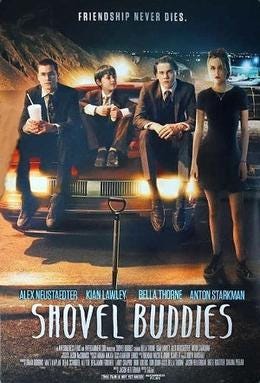FILM: The AI-Versus-Human Challenge
An interview with Screenwriter Jason Hellerman describes how a contest between screenwriters revealed deeper truths about human creativity


Would you watch a movie that was written by an artificial system?
Films exist in that strange half-lit world of dreams, where reality is remixed and reflected and turned into a flickering shadow. Then, only a hundred or so minutes later, those shadows fade away when the projector (or the computer) is turned off. Film life is not real life, but many of us find meaning and substance in this nearly 200-year-old medium.
Like most of you, even though I know it’s not real life, moving images catch my interest regardless of provenance. So I might click on an appealing idea on a redeye night flight while falling asleep, but watching AI slop doesn’t usually carry a ton of appeal. People tend to avoid anything made by chatbots.
Chances are, however, despite your best efforts at avoiding artificial interactions, you might be watching fake films already.
Many screenwriters are increasingly using AI-driven tools as “assistants” to help them write pages faster, come up with story ideas, and even to compose dialogue. The techniques vary, but the tools are out there, and many are taking advantage of them.
“No part of me believes that AI could foster creativity, because it just regurgitates what it finds online. You're basically getting the bologna of ideas,” says Jason Hellerman, an award-winning writer for film and television. “To be original, truly original, you have to look into your own soul and decide what you believe about the world.”
A screenwriting group held a friendly contest to answer this critical question:
How good are readers at distinguishing AI-assisted writing from an entirely human version?
Overwhelmingly, human audiences have repeatedly demonstrated — in multiple studies — that they prefer human-created creative content over AI slop. But the problem remains that human beings aren’t that good at telling human from AI work.
Hellerman, whose thoughts on screenwriting can be found over at No Film School, organized a screenwriting group for a friendly contest to answer this critical question:
How good are readers at distinguishing AI-assisted writing from an entirely human version? And which one would they prefer?
The concept was simple: take a given premise, and write the first ten pages of a movie-length script treatment. The writers would create two different versions, one with AI-driven support, the other purely human-derived. Readers would then vote on which version they liked more, and try to decode which script was written by which human or non-human entity.
To even up the odds (it was, after all, a single writer versus a team of two, plus a virtual robot) and also to highlight the claimed primary advantage of the AI-assisted version—increased speed—the AI team gave themselves only a few hours to complete their treatment, while Hellerman was given a full week. (You can read the finished script pages, and more about the parameters of the competition here).
The Winner? Readers picked Hellerman’s script, which was not surprising.
But while the human version was the ostensible “winner,” when voters were asked which one they thought was the AI-assisted version, they picked Hellerman’s, much to his dismay.
“It actually hurts me deeply that more people thought (my script) was AI, because I think I am really unique in terms of my voice on the page,” wrote Hellerman. “Also, I legit thought 'Jessie Jablonski' was a really funny name.”
Now, to be clear, a computer system didn’t actually write the other version on its own. You can watch this video to learn more about the other team’s process. It’s a fascinating learning experience. Matt Walsh and Krista Suh’s team essentially used the AI as a writing partner; in fact, they never handed full control to the chatbot.
Yet despite the human-at-the-wheel, you might feel a certain chill in your veins as they toss ideas back and forth with a chipper voice from the ether, spouting ideas in the kind of vacuous tone one associates with a slick ad exec in full pitch mode.
Yet the competition itself is less interesting than Jason’s description of his process:
“I had to find a personal way into this story, so I just took a walk. I smoked a cigar at the V Cut on Melrose. I had a great IPA at All Seasons Brewing. I lived my life because a lot of writing is just being a human being and having some real-life experiences—not sitting and chatting with a bot. While chatting in the cigar shop, I spoke to this lawyer who was telling me about feeling responsible for one of his younger associates. That sparked an idea I really liked. One with actual emotions I understood.”
Contrast that with how the AI-assisted writers work, and you understand not only how an analog approach serves the writing, but also ourselves and our basic humanity.
“You have to rewrite so much of the ideas AI spits out that it's not any faster than actually writing it down when you get an idea,” writes Hellerman, “and is it more pleasurable than a beer, a conversation, and a cigar? I doubt it.”
I reached out to Hellerman to get more of his thoughts on creativity, storytelling, and the real point of being a writer. Here’s our interview: *
HI: Hi Jason! I hugely enjoyed your article and this whole exercise. It made me want to get out of the house and off my machines, just for the general good of my soul.
The authors of the “AI” piece, from their perspective, are still writing it themselves, only with AI assistance. This speaks to the question of what comprises “human-derived” art. What level of AI assistance, in your opinion, still counts as “human”? How do we make that distinction? Or is the work invariably tainted as soon as a sliver of AI makes its way into the process?
Hellerman: All art is subjective, so no matter what I say here, it'll just be my opinion. For me, it stops being art when AI is actually constructing the thing you're looking at. So, if AI builds the image or even the backbone of a story...then what can you say you actually did? What part of your soul is on display?
Here's an analogy I like to use: coloring books. Now, if you were a good little boy or girl and colored in the lines, are you an artist? No. You're just someone completing something.
But if you were a good little kid who drew me a picture and then colored it in, I'd hang it on my wall, because that's art.
HI: I wonder if some aspects of writing a screenplay might be more defensible than others. Like, the setup and even some of the mechanics of plot/story might be in a different class than the dialogue, which is such a core character/human element.
When I read the two versions, yours feels more "lived in" to my ears (or eyes, I guess), and I think it largely has to do with the implied beats in the dialogue, the relative subtlety in how you indicate a history for the characters as well as the relationship between them. Do you think that's a reasonable take? Or do you think the creative process can even be parsed out like that?
Hellerman: I think that’s reasonable mostly because you’re writing stuff you’ve thought about - you have to live in it because it has to come from you. If you’re using AI, you start the process basically taking dictation of someone else’s ideas - it’s harder to mold that. And harder to make it sound like you later.
HI: When you talk about your process, you talk about being in the real world, doing things, talking to other humans, etc. As I read that, it got me thinking about WHY writers do this work in the first place, and what it provides beyond the raw output itself. Isn’t part of the reason writers do what they do in the first place about the opportunity to reflect their experiences with life on planet Earth? If writers are primarily riffing on ideas with an entity that never leaves the house, what’s the point of being a writer?
Hellerman: In my experience, I'm writing because I want to tell you what I believe and maybe persuade you as well.
I decided what I believe through living a life where I interact with a ton of people. I hear their stories, I see their experience, and I have a lot of ups and downs on my own that contribute to my overall worldview.
HI: Related question: If we end up in a world where the majority of the output is AI-assisted, just cranking out pages, we land in a cycle of recycling. Eventually, nothing new actually enters the process. A writer uses the AI to iterate, the AI takes that into its great maw of data considerations, and eventually, there’s no “new” input. The ideas it’s producing are not original in the true sense of the word, they’re derived. Can you elaborate on how actual, real-life experience is crucial to the creative process?
Hellerman: Everyone writes with a different voice or style, but I believe everyone comes to writing because they want to be heard. If you're just sitting at a laptop talking to your phone while on ChatGPT, chances are that's the only thing listening to you.
How will you find something universal to talk about if the thing that's telling you an idea is interesting or worth pursuing has no brain and no soul? Even a dog listens if you're talking about treats or walks. But a computer is just a regurgitation machine, a vomitorium of the past, that has no actual relationship to any object in the real world. And in that case, where the real world is necessary, why waste any time with it?
All storytelling, from Homer to Homer Simpson, has been about connecting with the narrative history, the past real world experience and the emotional landscape of our shared humanity.
A chatbot program is merely creating a shadow play of those ideas — as in Plato’s Allegory of the Cave — yet all it knows are the reflections, not the truth. When a computer picks up old ideas and vomits them out, we see only shadows, not substance.
* (This conversation with Jason Hellerman was condensed and edited by a human using analog tools).



